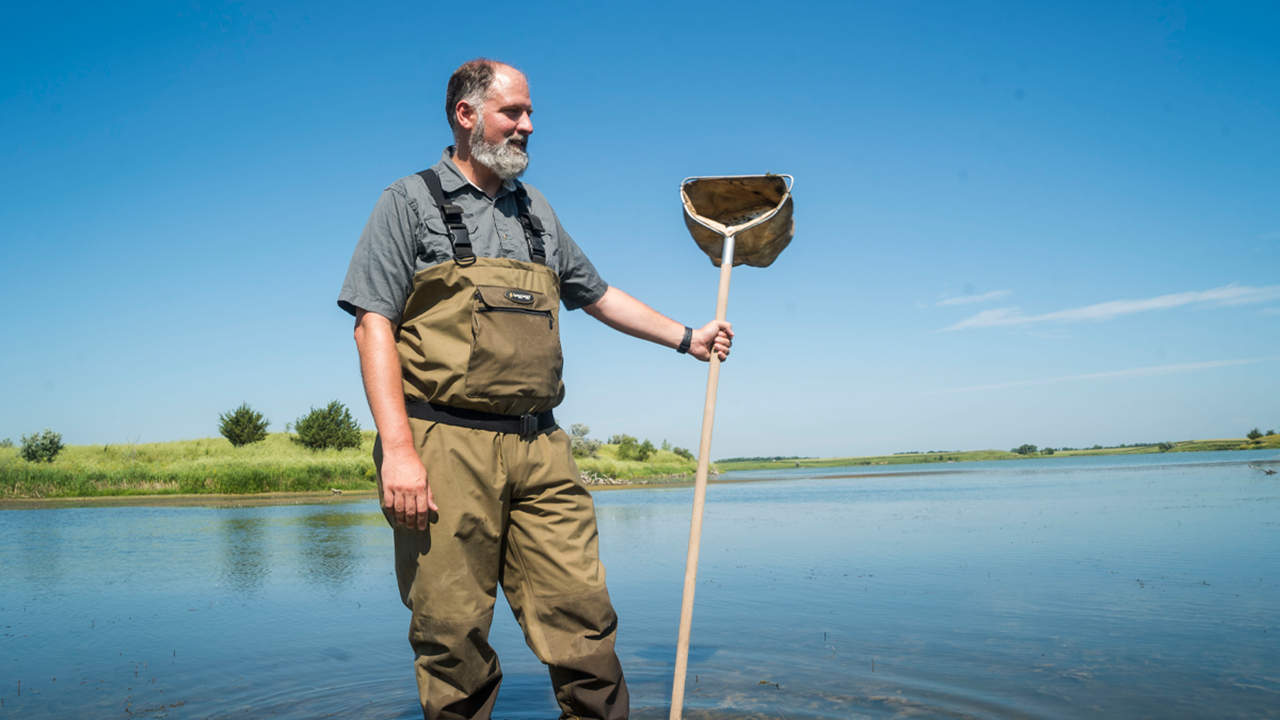Biology Department Chair Emphasizes Value of Undergraduate Research

“I initially got involved in research by doing it as an undergraduate, and it was a huge opportunity for me,” Kerby said. “I feel indebted to that, so I make it a point to include a lot of undergraduates in my research. I also highly value undergraduate research because I see how important it was in forming my career.”
During the summer months each year, several students in the biology department complete research in Kerby’s lab. While each student’s research varies, they all fall under the scope of aquatic ecology, with most of the research being related to the impact of contaminants on various amphibian and reptile species in South Dakota.
As someone who has decades of research experience and who’s been interested in this area of science since his undergraduate days, Kerby formulates broad questions that guide student research within the lab. From there, he encourages the students to come up with their own unique speculations and advises them as they seek to find the answers.
“It’s difficult for an undergraduate student to come up with an entire project on their own; that’s just not how science works,” said Kerby. “I try to get them in the lab early on and get them the experience they need. Then, I let them generate their own questions from there.”
"Having spent time in Kerby's lab since I was a freshman, I've been able to see the different ongoing experiments that other students were able to work on. This opportunity prepared me to take on the challenge of completing a project independently," said Elle Hoops, a junior studying medical biology who worked on a project researching the impacts of contaminants on tadpoles.
Junior medical biology major Ella Wittmuss spent a summer looking at amphibians and exploring the impact of stressors, like disease, temperature and environmental toxins, on their hormone levels.
Another student, Elizabeth Brust, a junior double majoring in medical biology and international studies, hopes her project leads to the development of a new diagnostic method for disease in amphibians that can be used in resource-limited settings.
Although all of the students’ research projects try to uncover solutions to different problems, they all have the same underlying purpose: to inform and advance conservation efforts of aquatic species in South Dakota.
“The students’ research offers insight into both the management of species and how contaminants get into water sources in the state,” said Kerby. “We hope to get an understanding of which pesticides might be safer than others and how much to apply so we can inform groups like farmers and hunters in South Dakota.”
While students initially seek out research opportunities as a way to enhance their resume, they tend to leave the experience with more than that, Kerby said. Along with gaining insight into the scientific process, students gain invaluable life skills that are transferrable to any career path they choose, with many of the students going on to medical school and pursuing careers in the health care field.
"I emphasize the importance of teamwork in both doing the research and also coming up with solutions," said Kerby. "More and more workplaces are built on collaborative platforms because they work the best. I rely on the students to come up with solutions and they can be quite clever in doing so. As it turns out, communication and critical thinking skills are invaluable no matter what the chosen career.
"While they often leave with fond memories of amphibians and reptiles, they also have learned a significant amount of responsibility and leadership along the way."
Brust hopes to one day work in oral and maxillofacial surgery, and while dentistry and amphibians don’t have much in common, she said that her undergraduate research experience has helped provide her with the skills and knowledge she needs to be successful.
“Research requires you to think critically, analyze data and think of creative solutions for unforeseen problems,” Brust said. “These skills are applicable and essential to dentistry, as diagnosing and treating oral health issues often requires problem-solving abilities.”
With all the responsibilities that come with being the department chair, the time that Kerby can spend in the field and in the lab with students is limited. However, his open-door policy and personal mentorship ensure students have all they need to succeed – both in their research and in their life following graduation.
“I’m not in the lab with them every day, but nonetheless, there’s a relationship that forms there,” said Kerby. “That’s really important because there’s trust, and these students feel comfortable talking to me later on about applications to medical and dental school and their career choices. That part of the mentorship continues outside of the research.”
Looking back at the pivotal impact his early research experiences had on the course of his career, Kerby said he hopes to continue to change the narrative of research and engage students in these experiences early on.
“I often find that undergraduate students don’t always know what research is, so they’re scared to be a part of it,” he said. “A lot of people think research is a brilliant thought, an ‘aha’ moment and an answer, but research to me is thinking of an idea that might not be that interesting and grinding away at it until you find something that’s really cool.
“In particular, a lot of these undergraduates’ experiences are actual research, where mishaps happen and the answer isn’t always there,” he continued. “But I think it can be a really vital part of not only their college experience, but also their life experience.”



